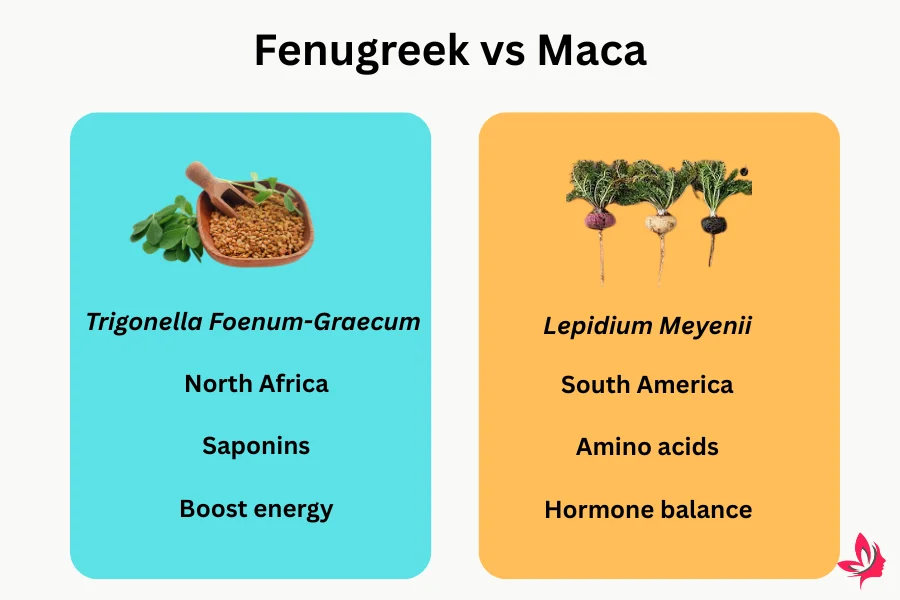Can you take fenugreek and maca together? Many people seek safe, natural ways to boost their energy, support hormonal balance, or aid in recovery from workouts.
This post provides facts to help readers make informed choices about these supplements.
You can take fenugreek and maca together, and research does not show harmful effects from combining them.
Some people use these herbs to boost energy, improve mood, or enhance overall wellness, and they are often sold as combination supplements.
Can You Take Fenugreek and Maca Together?

Many people want to know if they can combine these herbal supplements for energy, hormonal balance, or general wellness.
Both are derived from plants used in traditional medicine and are readily available in health food stores.
Here’s a comparison table summarizing the key differences and similarities between Fenugreek and Maca:
| Feature | Fenugreek | Maca |
|---|---|---|
| Origin | North Africa, Mediterranean | Andes Mountains, South America |
| Traditional Uses | Seeds, powder, supplements, and teas | Hormone balance, endurance, energy |
| Common Forms | Increase breast milk, improve blood sugar, and support testosterone | Powder, capsules, supplements |
| Key Active Compounds | Saponins, fiber | Amino acids, minerals |
| Main Modern Uses | Boost energy, support mental health, and aid stress response | Dietary supplement (no prescription required) |
| Side Effects | Diarrhea, maple syrup smell in urine, interacts with blood thinners | Fewer side effects; caution for hormone-sensitive cancers |
| Supplement Status | Dietary supplement (no prescription needed) | Dietary supplement (no prescription needed) |
| Research | Limited, small studies; mixed results | Limited, small studies; mixed results |
What Are Fenugreek Seeds and Maca Root?
Fenugreek seeds, also known as Trigonella foenum-graecum, are small, yellowish-brown seeds used in cooking, as supplements, and in teas. Maca root, known as Lepidium meyenii, is native to the Andes mountains and is usually sold as maca powder or capsules.
Fenugreek may help increase breast milk production, improve blood sugar, and support testosterone levels in some men. Maca root may help boost energy, support mental health, and aid the body in handling stress.
Both fenugreek powder and maca extract are considered dietary supplements in the United States. You can purchase them without a prescription, but a doctor should monitor higher doses or long-term use due to potential side effects, such as an upset stomach or allergic reactions.
Traditional Medicine Uses: From North Africa to the Andes Mountains
Fenugreek seeds have a rich history in traditional medicine, particularly in North Africa, the Mediterranean, and Central Europe. Practitioners used it for digestion, lowering blood sugar levels, and enhancing milk production.
Maca root originates from the Andes Mountains, where it has been used for centuries to support hormone balance, enhance endurance, and boost energy.
Today, people use these herbs as health supplements. Their uses include helping with menopausal symptoms and increasing semen quality, though research in humans is limited, and most studies are small.
Key Differences: Trigonella Foenum-Graecum vs. Lepidium Meyenii
Fenugreek (Trigonella foenum-graecum) and maca root (Lepidium meyenii) have different active compounds and health effects. Fenugreek contains saponins and fiber, which may help support healthy cholesterol.
Maca root provides amino acids and minerals, supporting stamina. Clinical trials give mixed results about their actual benefits.
Fenugreek may interact with blood thinners and can cause mild side effects like diarrhea or a maple syrup smell in urine. Maca root has fewer side effects, but people with hormone-sensitive cancers should talk to a doctor before using it.
Discuss both supplements with a healthcare provider, as there is limited evidence and potential interactions. Many products online combine fenugreek and maca root, but professional guidance is recommended, especially when using larger amounts.
Health Benefits of Combining Fenugreek and Maca Root Powder

Fenugreek and maca root powder are popular herbal supplements known for their benefits to hormone balance, energy, and overall wellness.
Their combination may offer benefits for both men and women, particularly in terms of maintaining healthy energy levels and supporting hormones.
Potential Health Benefits and Herbal Remedies
Fenugreek seeds and maca root are valued in traditional medicine in the Mediterranean and the Andes mountains. People use them to support energy, balance hormones, and improve wellness.
Maca root may boost libido and mood. Fenugreek powder is used to help regulate blood sugar and cholesterol levels, and may also support breast milk production.
Clinical trials are limited but suggest possible uses for hormonal balance, especially for low libido or menopausal symptoms.
For optimal results, consult a healthcare provider before using larger amounts or combining this supplement with other medications or supplements.
Effects of Maca and Fenugreek on Testosterone Levels and Energy Levels
Early studies suggest these herbs may help support healthy testosterone, especially in men with age-related declines. Maca powder may help with sexual dysfunction and semen quality.
Fenugreek supplements are often studied for their effects on muscle mass, strength, and energy. Some research reports a decrease in body fat and stronger exercise performance, though the evidence is not conclusive.
Users should watch for side effects, such as an upset stomach or allergies, especially at higher doses or without medical supervision.
Adaptogenic Properties and Mental Health Support
Maca extract is an adaptogen, believed to help the body manage stress. Fenugreek’s adaptogenic properties are less established, but both may support mental health, mood, and hormone balance.
Some users report an improved mood or reduced fatigue after using these supplements. However, there is not enough evidence from extensive studies on long-term mental health effects.
Individuals with health conditions should consult a healthcare provider before starting any new supplements.
Safety, Side Effects, and Medical Considerations

Many people use these herbal supplements to boost energy, regulate hormone balance, and achieve other health goals. Like all dietary supplements, it is essential to be aware of potential side effects and know when to consult a healthcare professional.
Possible Side Effects and Adverse Reactions
Both fenugreek and maca root are usually well-tolerated in recommended amounts. Some people may experience mild side effects, such as an upset stomach, diarrhea, or a maple syrup-like odor in their body fluids, after taking fenugreek.
Allergic reactions to fenugreek or maca powder are rare but possible. Signs include rash, itching, shortness of breath, or swelling.
People with hormone-sensitive conditions, such as breast cancer or ovarian cancer, should be cautious. Both herbs may affect hormone levels, but clinical trials have shown limited evidence of other significant effects.
Medical Conditions, Blood Thinners, and Drug Administration
Individuals with medical conditions, particularly those affecting hormones or blood sugar levels, should exercise caution when consuming fenugreek or maca.
Fenugreek may lower blood sugar and cholesterol levels; therefore, individuals with diabetes or those taking related medications should consult a doctor first.
Fenugreek can interact with blood thinners like warfarin and increase bleeding risk. Take supplements under medical supervision if you use prescription medications or have ongoing health issues.
Importance of Consulting a Healthcare Provider or Medical Degree Holder
Ask a healthcare provider before starting fenugreek or maca powder, especially if you are pregnant, have uterine fibroids, or take medication. Medical supervision helps prevent side effects and ensures that supplements do not interfere with treatments or exacerbate underlying conditions.
Supplements like black maca, ashwagandha, or ginkgo biloba also possess adaptogenic properties, but may have different safety concerns or potential interactions.
In the United States, most herbal remedies, including fenugreek and maca, are sold in stores and online, but they are not as strictly regulated as prescription drugs. If you have health conditions or are unsure about your dosage, consult a healthcare provider.
Scientific Evidence: What Do Clinical Trials Say?

Fenugreek powder and maca root are gaining attention as herbal remedies for various health conditions, but research on their combined use is scarce.
Some findings are promising, but more clinical trials are needed before experts can make strong recommendations.
Limited Evidence, Double-Blind Randomised Clinical Study, and Placebo Group Findings
Few studies have investigated the combination of fenugreek and maca. Clinical studies have evaluated these herbs separately.
One double-blind randomised clinical study found that fenugreek seed extract improved muscle performance and strength compared to a placebo group.
These studies often employed a control group to verify the results. However, most trials included only small groups of healthy individuals, making it difficult to determine whether the results apply to everyone.
Effects on Serum Hormone Levels, Semen Quality, and Sexual Dysfunction
Some research suggests that fenugreek can increase testosterone and improve body composition. Maca root has been studied for low libido and sexual dysfunction, especially in people with age-related hormone decline.
Results on serum hormone levels or semen quality vary. Some studies have shown a modest increase in energy or semen quality, while others have found no significant difference compared to a placebo. To date, there is insufficient evidence to confirm that these supplements are effective for these purposes.
Maca Powder, Fenugreek Seed Extract, and Dietary Supplements in Research
Researchers have investigated the potential benefits of both fenugreek seed extract and maca powder as dietary supplements. Most studies examine their effects as part of herbal supplement routines or in comparison to other herbal remedies, such as ashwagandha or tribulus terrestris.
Few studies have examined the effects of combining fenugreek and maca. Side effects, drug interactions, and long-term safety are not well understood. Anyone interested in these supplements—especially those seeking higher doses or treatment for severe conditions—should consult a healthcare professional.
How to Use Fenugreek and Maca Root Together Safely

Fenugreek and maca root are popular herbal remedies known for their benefits to energy, hormonal balance, and overall wellness. People should know how to use them safely to minimize side effects and maximize benefits.
Dosage, Larger Amounts, and Higher Dosages: What’s Safe?
It is generally safe to take fenugreek and maca root together at recommended doses. For most healthy adults, a daily dose of 500 mg to 1000 mg of each is typical.
Be careful with larger amounts, as these may cause an upset stomach, allergic reactions, or other side effects. Clinical trials have shown that bloating, diarrhea, or a maple syrup-like smell in sweat can occur, especially with fenugreek.
Individuals taking blood thinners or those with underlying medical conditions should consult a healthcare provider before starting any new supplements. Moderation helps avoid side effects and unsafe interactions.
Choosing Between Fenugreek Powder, Maca Extract, and Other Forms
Fenugreek and maca are available in powder, capsule, tea, and extract forms. Fenugreek powder and extract are common in stores and pharmacies.
Maca is often sold as powder, capsules, or extract. Choose a form based on preference and how easily your body absorbs it.
Capsules are convenient, while powders can be easily mixed into foods. Buy from reputable brands and verify their products through third-party testing or FDA compliance to ensure safety and quality.
Tips for Healthy People, Pregnant Women, and Those with Health Conditions
Healthy individuals usually tolerate these supplements well, but certain groups may require extra caution. Pregnant women should avoid fenugreek because early research suggests possible risks to pregnancy and uterine contractions.
People with breast cancer, ovarian cancer, uterine fibroids, or hormone-sensitive issues should talk to a healthcare provider. Fenugreek and maca can affect hormone levels.
People with diabetes should monitor their blood sugar levels, as fenugreek may lower them. Anyone on medication, with chronic health conditions, or experiencing side effects should seek medical advice. Age, weight, and medical history can affect safety and results.
Frequently Asked Questions
Fenugreek and maca root are two natural supplements commonly used to support energy levels, hormone balance, and weight management. People often have questions about mixing them, their effects, and what to avoid.
Can fenugreek be taken with maca?
It is safe to take fenugreek and maca root together if you use the recommended dosages. Research and expert advice indicate that combining fenugreek and maca root does not result in serious interactions.
What supplements should not be taken with fenugreek?
Fenugreek can interact with blood thinners, diabetes medications, and some other supplements. Find a complete list of possible drug interactions with fenugreek at Drugs.com.
What should you not take with maca root?
No significant supplement interactions have been reported for maca root. People with hormone-sensitive conditions should be cautious. Consult a doctor before starting maca root if you have any special health concerns.
What hormones does fenugreek increase?
Fenugreek may boost testosterone in men. It may also support estrogen levels, but most effects are mild.
Does maca affect female hormones?
Maca root does not contain hormones, but it may help balance estrogen levels in women. Some studies suggest that it may help alleviate menopause symptoms or support regular menstrual cycles.
When should you avoid maca?
People with hormone-sensitive health issues, like breast cancer or uterine fibroids, should avoid maca. Pregnant and breastfeeding women should not use maca unless a doctor approves.
What does maca root pair well with?
Maca root pairs with plant-based proteins, adaptogens, or energy-boosting supplements. It also pairs well with fenugreek when used safely. Many people mix maca powder with other natural powders in smoothies.
Is fenugreek good for weight loss or gain?
Some people use fenugreek to support weight gain because it may boost appetite. Its use in gaining weight is more common than for weight loss.
Should you take maca in the morning or at night?
Maca can be taken at any time of day. Some people take it in the morning for an energy boost, but it ultimately depends on personal preference.
How long does it take for fenugreek to work for testosterone?
You may notice changes in testosterone after a few weeks of taking fenugreek. Results depend on health, dosage, and adherence to a consistent regimen.




